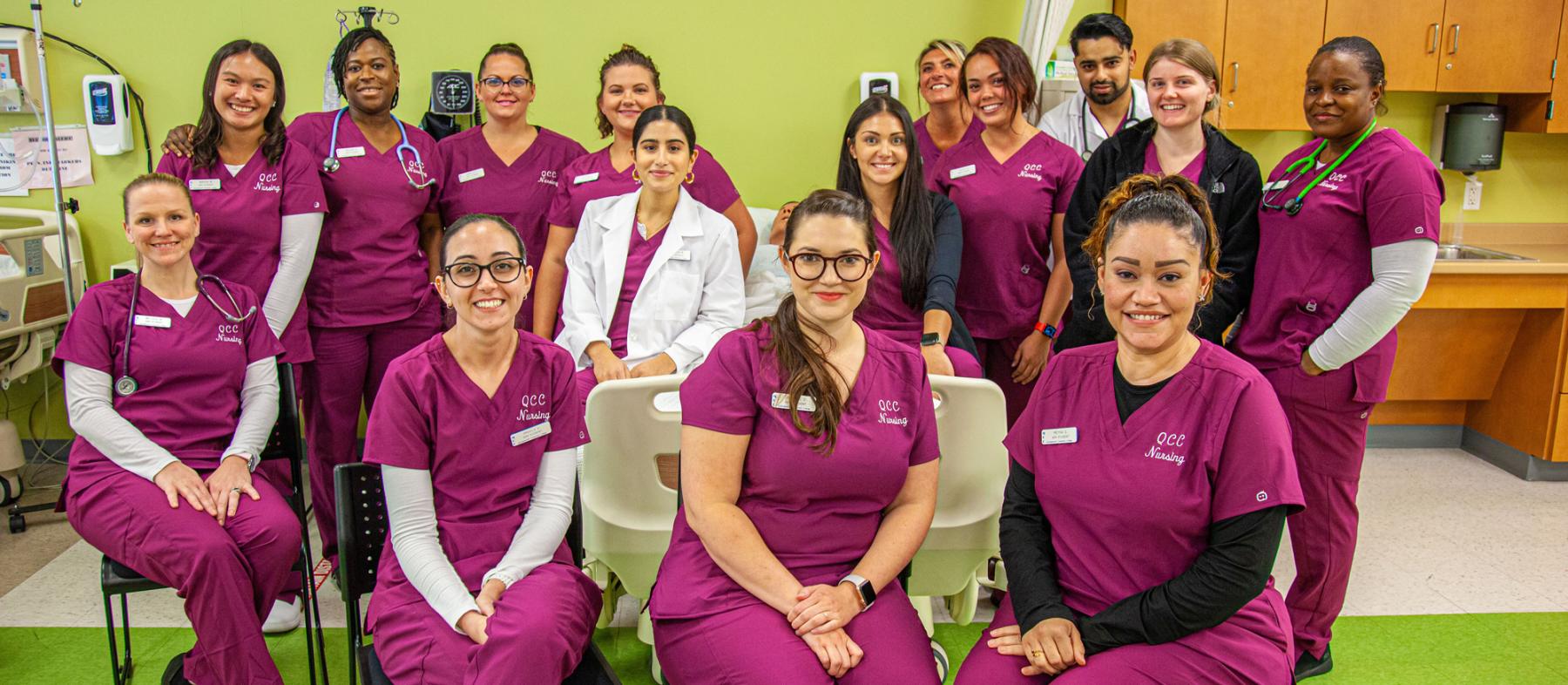Philosophy
We believe that:
Nursing is a caring, theory-based discipline focused on assisting the patient and significant support person(s) to achieve an optimal level of self-care, while protecting and promoting patient dignity. The science of nursing is a distinct, constantly evolving body of knowledge that encompasses rational and scientific principles upon which nursing interventions are based. Plan of care is flexible, patient centered, cost effective, attentive to patient diversity, and occurs within the context of the patient’s family and environment. Nurses utilize the nursing process, open, civil and therapeutic communication, critical thinking, and evidence-based information while working collaboratively with members of the health-care team. Nurses function within the standards of practice, demonstrating safe, competent, and legal-ethical practice.
The individual (Healthcare Consumer) is a valued, complex and unique being that has a dynamic capacity for self-care. The individual is understood as an integrated and whole being who functions biologically, psychologically, socially, spiritually and developmentally. The individual has the potential to make choices that will meet his/her own needs for self-care and lead to ongoing growth as human beings.
Environment – Individuals are best understood in the context of their environment. The environment consists of evolving, dynamic, culturally diverse conditions, which are influenced by family, specific living conditions, political, social, demographic, and economic factors.
Health is a state of physical, social, and spiritual well-being and not merely the absence of illness. Health status exists on a continuum and varies because of interactions between the patient and the environment.
Teaching/Learning is an active, dynamic, continuous and creative process of attaining and sharing knowledge, involving the patient, significant support person(s) and the health care team. As educators, nurses assist the patient/families by supporting self-care activities, while facilitating informed decision and achievement of positive outcomes.
Nursing education/scholarship occurs within a system of higher education and is a planned approach to the acquisition of knowledge. Nursing education progresses from the simple to the complex, facilitates the development of cognitive, psychomotor and affective knowledge and provides for multiple points of entry into the profession. The outcome of nursing education, at all levels, is to prepare a graduate who accepts professional responsibility and accountability. Nursing education supports participation in professional organizations. Cultural diversity within the classroom is valued and promotes appreciation and respect for differences within the college and beyond. The role of the faculty is to guide, support, facilitate learning, and model professional practice, while instilling commitment to lifelong learning. Faculty also strive to instill a sense of professional empowerment including commitment to social justice and community service. The role of the student is to translate classroom learning into nursing practice through the spirit of inquiry, evidence-based and reflective nursing practice.
The Licensed Practical Nurse provides quality patient-centered, evidenced-based care to vulnerable multicultural/diverse groups across the health care continuum, particularly among older adults and other population clusters that need long-term, community-based chronic care. The Practical Nurse cooperates and collaborates with health team members, patients and families and delegates the nursing care provided by unlicensed personnel. The Licensed Practical Nurse uses scientific knowledge and technical skills to continually assess the physical, emotional, and social status of their clients and they work with patients and their families to devise care plans for each situation in accordance with best nursing practice.
The Associate Degree Nurse advances the nursing process to implement nursing actions in varied complex settings, and assist patients in meeting or maintaining self-care needs. The associate degree nurse cooperates and collaborates with other members of the health care team to give direct care to patients, families, and community groups. The associate degree nurse is also responsible for the delegation of nursing action.
Program Outcomes
Program outcomes are defined as performance indicators that reflect the extent to which the purposes of the nursing education unit are achieved and by which program effectiveness is documented. Program outcomes are measurable, consumer-oriented indexes designed to evaluate the degree to which the program is achieving its mission and goals. Example include, but are not limited to, NCLEX examination pass rate, program completion rate, and job placement rates.
Graduates from either the QCC Associate Degree or Practical Nursing Program are qualified to work in the state of Massachusetts upon the successful attainment of the appropriate licensure. Not all states accept a Massachusetts license. If you intend to practice outside of Massachusetts and obtain a license in another state, you are encouraged to review the NCSBN website for eligibility. As an applicant to the QCC Nursing Programs, you are encouraged to discuss your eligibility for licensure and work in another state other than Massachusetts with the Program Chair of the Associate Degree or Program Chair of the Practical Nursing program.
QCC Health Requirements
- Physical Exam - Performed and signed by PCP/NP/ PA within 12 months of the start of the program.
- Tetanus -(Tdap) documentation of receiving Tetanus injection within the last 10 years.
- Flu vaccination - Documentation of receiving flu vaccination for the current Influenza season.
- Meningococcal Vaccine - One dose of Meningococcal (MenACWY) for students 21 years of age and younger administered after 16th birthday.
- Tuberculosis Screening - Documentation of two negative Tuberculin Skin Tests (2 STEP TB) and annual testing thereafter OR a serum TB test (QuantiFERON) may be used instead of a 2 STEP Tuberculin Test OR a Negative Chest X-Ray and yearly review. If result is positive, students must provide documentation of a Chest X-Ray showing no active disease within 12 months of program start date.
- COVID-19 Vaccine - Clinical placement sites may impose additional requirements, including proof of COVID-19 vaccination. Students must submit the appropriate documentation to participate in clinical experiences.
- Varicella - Varicella titer demonstrating immunity to Varicella.
- Measles, Mumps, and Rubella - immunity titers for each disease demonstrating immunity to each disease.
- Hepatitis B Antibody titer - Positive Hepatitis B Surface Antibody titer which demonstrated immunity to the Hepatitis B Virus. If titer result is negative, students must provide documentation of having a complete Hepatitis B vaccination series, receive Hepatitis B boosters, and recheck Hepatitis B antibody titers as ordered by their PCP.
- Copy of current health insurance card on file.
- Healthcare Provider Level CPR Certification.
Please contact our Healthcare Compliance Officer at healthcompliance@qcc.mass.edu


